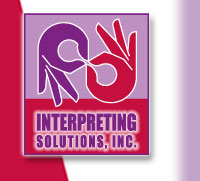
           |
 |
 |
|
|
|
Speech to Text (s2t)
"I became deaf as a teen, " said Marty (name changed), "and while I have consistently taken sign language classes since then, I've never become good enough at understanding sign language to function well with an interpreter. At my job, I was stuck in a low-paying position because I could not participate in the training I needed to get a promotion. Speech to Text services met my communications needs." The right to communications access is guaranteed by both state and federal laws. For deaf, hard of hearing, deaf-blind, or late-deafened people who can understand sign language, a sign language interpreter is vital in community based settings such as the work place, medical settings, or social events. But, for those who can read English, but who don't know sign language well enough to use a sign interpreter, s2t, or "speech to text" services provide a viable and growing option. S2t services include several types of services: CART, or real time captioning, is provided by a specially trained, nationally certified court reporter using machine shorthand and a special computer program. CART is a verbatim service and produces between 15 and 20 pages of written text per hour for the user to read. A CART provider uses a specially designed stenographic machine and a laptop computer to convert each word into print. Interpreting Solutions, Inc. can provide you with CART services through subcontracts with CART providers across the United States. CART can be provided onsite (at your location) or remotely (the CART provider is located off site). It's easy to schedule CART services- simply call Interpreting Solutions, Inc. at 414-226-8191. We'll ask you for information about the situation to help you determine if CART best meets your needs. Then, we'll do all the work of finding, scheduling, and deploying a CART provider to meet your needs. C-PRINT(tm) and TYPEWELL(tm): There are two other commercially available computer-mediated methods that provide speech-to-text services in work place, classroom, meeting, or other settings. C-Print(tm) and TypeWell (tm) are sometimes called "text interpreting." Much like sign language interpreting, the provider listens to the auditory input and outputs the meaning. The consumer reads the printed information on a laptop or, for a large group, on a display. The provider uses a special code or shorthand so that their abbreviations are accurately translations of the spoken message into print. This type of "text interpreting" ensures high contact accuracy while providing the deaf or hard of hearing consumer with an "almost verbatim" text rendering. This allows the provider to use specialized software on a two linked laptop computers, rather than a stenographic machine linked to a computer, to provide text output. If you use "text interpreting" technologies, you'll be reading between six and ten pages of text per hour of lecture. Interpreting Solutions, Inc. is one of the first community-based speech-to-text providers in the country. While CART was originally developed for court room settings, C-Print and Typewell were originally developed for use in a classroom. Recognizing that the needs of deaf and hard of hearing consumers in a wide variety of community settings will be different from the typical classroom setting, Interpreting Solutions, Inc. is training C-Print(tm) and Typewell(tm) providers to work in every type of community setting. Our employees who provide Community-based Speech-to-Text services bring our own equipment to your site, set it up, and show you how to use the service. To request Community-based Speech to Text Services, simply call us at Interpreting Solutions, Inc. at 414-226-8191. We can take it from there! Which should you request? Interpreting? C-Print? Typewell? CART? We can help you determine which service best matches your needs! Give us a call for a free consultation. 414-226-8191.
|